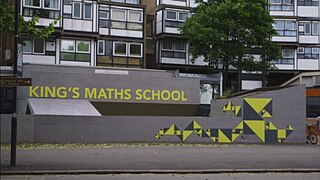
In England, a City Technology College (CTC) is an urban all-ability specialist school for students aged 11 to 18 specialising in science, technology and mathematics. They charge no fees and are independent of local authority control, being overseen directly by the Department for Education. One fifth of the capital costs are met by private business sponsors, who also own or lease the buildings. The rest of the capital costs, and all running costs, are met by the Department.

David Terence Puttnam, Baron Puttnam, CBE, HonFRSA, HonFRPS, MRIA is a British-Irish film producer, educator, environmentalist and former member of the House of Lords. His productions include Chariots of Fire, which won the Academy Award for Best Picture, The Mission, The Killing Fields, Local Hero, Midnight Express and Memphis Belle. In 1982, he received the BAFTA for Outstanding British Contribution to Cinema, and in 2006 he was awarded the BAFTA Fellowship for lifetime achievement from the British Academy of Film and Television Arts.

Language Colleges were introduced in 1995 as part of the specialist schools programme (SSP) in the United Kingdom. The system enabled secondary schools to specialise in certain fields, in this case, modern foreign languages. Schools that successfully applied to the Specialist Schools Trust and became Language Colleges received extra funding for language teaching from this joint private sector and government scheme. Language Colleges act as a local point of reference for other schools and businesses in the area, with an emphasis on promoting languages within the community. They are also encouraged to develop links with schools and other institutions in foreign countries. There were 216 Language Colleges in the country by 2010.

The specialist schools programme (SSP), first launched as the Technology Colleges programme and also known as the specialist schools initiative, specialist schools policy and specialist schools scheme, was a government programme in the United Kingdom which encouraged state schools in England and Northern Ireland to raise private sponsorship in order to become specialist schools – schools that specialise in certain areas of the curriculum – to boost achievement, cooperation and diversity in the school system. First introduced in 1993 to England as a policy of John Major's Conservative government, it was relaunched in 1997 as a flagship policy of the New Labour governments, expanding significantly under Prime Minister Tony Blair and his successor Gordon Brown. The programme was introduced to Northern Ireland in 2006, lasting until April 2011 in England and August 2011 in Northern Ireland. By this time, it had established a near-universal specialist system of secondary education in England, with almost every state-funded secondary school in England having specialised. This system replaced the comprehensive system which had been in place since the 1970s.

An academy school in England is a state-funded school which is directly funded by the Department for Education and independent of local authority control. The terms of the arrangements are set out in individual academy funding agreements. 80% of secondary schools, 39% of primary schools and 43% of special schools are academies.

The Halley Academy is a secondary school and sixth form with academy status located on Corelli Road and near the Kidbrooke area of the Royal Borough of Greenwich in southeast London. It originally opened in 1954 as Kidbrooke Comprehensive School for Girls and was one of Britain's first purpose-built comprehensive schools. It started admitting boys in 1982. It changed its name to Corelli College in September 2011 when it became an Academy. It adopted its current name in March 2018, when it joined the Leigh Academies Trust.

Business and Enterprise Colleges (BECs) were introduced in 2002 as part of the Specialist Schools Programme in England. The system enabled secondary schools to specialise in certain fields. Schools that successfully applied to the Specialist Schools Trust and became Business and Enterprise Colleges received extra funding for applied business teaching from this joint private sector and government scheme. Business and Enterprise Colleges act as a local point of reference for other schools and businesses in the area, with an emphasis on promoting enterprise and commercial awareness within the community.
SSAT Limited is a UK-based, independent educational membership organisation working with primary, secondary, special and free schools, academies and UTCs. It provides support and training in four main areas: teaching and learning, curriculum, networking, and leadership development.

In the United Kingdom, a Technology College is a specialist school that specialises in design and technology, mathematics and science. Beginning in 1994, they were the first specialist schools that were not CTC colleges. In 2008, there were 598 Technology Colleges in England, of which 12 also specialised in another subject.

The Hathaway Academy, formerly the Grays School Media Arts College, is a coeducational, non-selective secondary school with academy status that is located in Grays, Essex, England. It is currently part of the Academy Transformation Trust. A school has existed on the Hathaway Road site since 1931, when the John Henry Burrows Central Council School moved from nearby Bridge Road. The school became a secondary technical in 1945 and a comprehensive school in 1971. In 1993, it was given grant-maintained status and was renamed the Grays School. In 2004, it specialised and became the Grays School Media Arts College, which closed in June 2013 with the subsequent opening of the current academy-status school. The academy school has since retained TGSMAC's specialisms, which are digital media and performing arts.
Medina College is a foundation secondary school in Newport on the Isle of Wight, formerly Medina High School.

Burnt Mill Academy is a secondary school academy and specialist performing arts college situated on First Avenue in Harlow, Essex, England. The school originally opened in May 1962 as Burnt Mill Comprehensive School, de jure keeping this name until academisation in 2011. In 2003, it became a specialist performing arts college, specialising in dance, drama and music. It joined the Confucius institute programme in 2007, partnering with Suzhou Lida Middle School in Jiangsu, China. This granted the school an International School Award. It gained academy status in 2011 and formed the Burnt Mill Academy Trust (BMAT) in 2013. BMAT has since become a multi-academy trust, with 12 member schools as of 2021.
Astor Secondary School is an 11–18 mixed, secondary school and sixth form with academy status in Dover, Kent, England. It was established in 1948 and is part of The Dover Federation for the Arts Multi Academy Trust.

A university technical college (UTC) is a type of secondary school in England that is sponsored by a university and has close ties to local business and industry.

Specialist schools in the United Kingdom are schools with an emphasis or focus in a specific specialised subject area, which is called a specialism, or alternatively in the case of some special schools in England, in a specific area of special educational need. They intend to act as centres of excellence in their specialism and, in some circumstances, may select pupils for their aptitude in it. Though they focus on their specialism, specialist schools still teach the full curriculum. Therefore, as opposed to being a significant move away from it, the specialism is viewed as enriching the original curricular offer of the school.

SEN Colleges, also known as Special Specialism Colleges, are specialist special schools in the United Kingdom. They were introduced in 2006 as part of the specialist schools programme following a successful trial in 2004. The system enabled secondary and primary schools to specialise in certain fields.

Applied Learning Colleges, formerly Vocational Colleges, were introduced in 2006 as part of the Specialist Schools Programme in England. The system enabled secondary schools to specialise in certain fields, in this case, vocational education. Schools that successfully applied to the Specialist Schools Trust and became Applied Learning Colleges received extra funding from this joint private sector and government scheme. In order to fulfil the criteria for Applied Learning College status schools had to either be designated as a High Performing Specialist School or select it as part of a combined specialist when first specialising. By 2009, 164 schools had specialised into an Applied Learning College.

A maths school is a type of specialist free school sixth form college in England which specialises in the study of mathematics. Each maths school is sponsored by a university and, frequently, also a nearby established sixth form college or multi-academy trust. All students in a maths school must follow a course of study that includes A-Levels in mathematics and further mathematics.

The Baker Dearing Educational Trust is a UK-based registered charity established to support, advocate and develop university technical colleges (UTCs) in England. An official partnership with the Department for Education has been made for this purpose. All schools with UTC status must have a licence agreement with the BDT as it is the creator and owner of the UTC model, trademarks and brand. This agreement is fulfilled via a license fee.

Specialist schools, also known as specialised schools or specialized schools, are schools which specialise in a certain area or field of curriculum. In some countries, for example New Zealand, the term is used exclusively for schools specialising in special needs education, which are typically known as special schools.

















